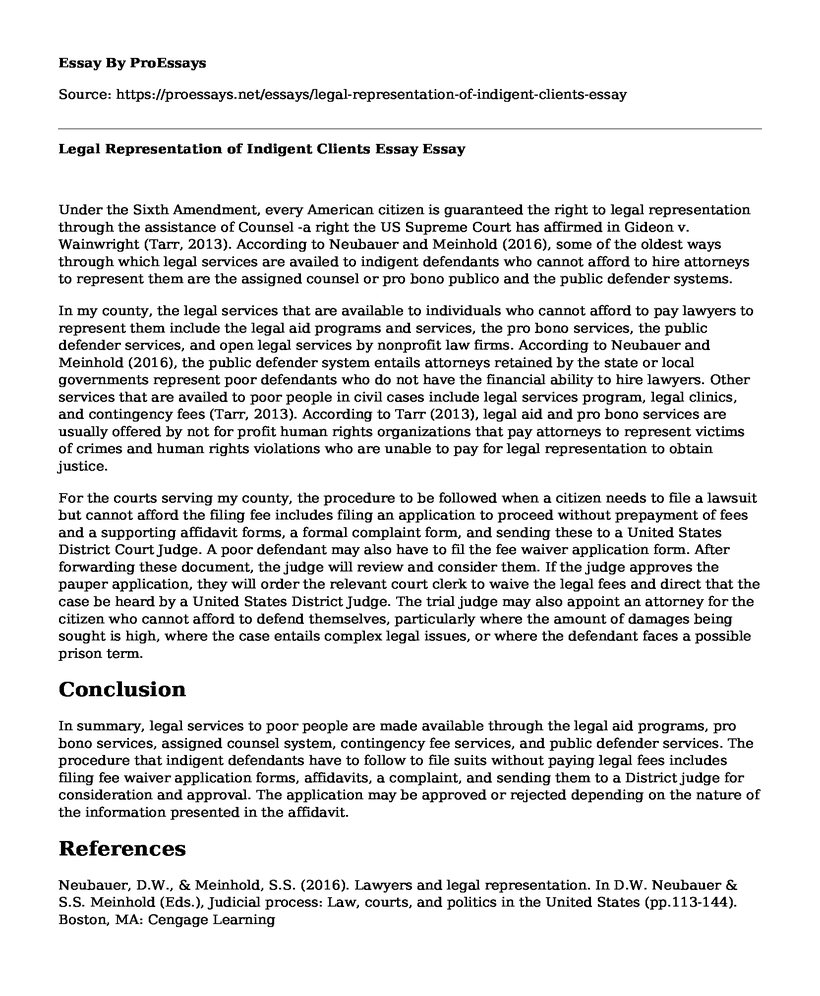Under the Sixth Amendment, every American citizen is guaranteed the right to legal representation through the assistance of Counsel -a right the US Supreme Court has affirmed in Gideon v. Wainwright (Tarr, 2013). According to Neubauer and Meinhold (2016), some of the oldest ways through which legal services are availed to indigent defendants who cannot afford to hire attorneys to represent them are the assigned counsel or pro bono publico and the public defender systems.
In my county, the legal services that are available to individuals who cannot afford to pay lawyers to represent them include the legal aid programs and services, the pro bono services, the public defender services, and open legal services by nonprofit law firms. According to Neubauer and Meinhold (2016), the public defender system entails attorneys retained by the state or local governments represent poor defendants who do not have the financial ability to hire lawyers. Other services that are availed to poor people in civil cases include legal services program, legal clinics, and contingency fees (Tarr, 2013). According to Tarr (2013), legal aid and pro bono services are usually offered by not for profit human rights organizations that pay attorneys to represent victims of crimes and human rights violations who are unable to pay for legal representation to obtain justice.
For the courts serving my county, the procedure to be followed when a citizen needs to file a lawsuit but cannot afford the filing fee includes filing an application to proceed without prepayment of fees and a supporting affidavit forms, a formal complaint form, and sending these to a United States District Court Judge. A poor defendant may also have to fil the fee waiver application form. After forwarding these document, the judge will review and consider them. If the judge approves the pauper application, they will order the relevant court clerk to waive the legal fees and direct that the case be heard by a United States District Judge. The trial judge may also appoint an attorney for the citizen who cannot afford to defend themselves, particularly where the amount of damages being sought is high, where the case entails complex legal issues, or where the defendant faces a possible prison term.
Conclusion
In summary, legal services to poor people are made available through the legal aid programs, pro bono services, assigned counsel system, contingency fee services, and public defender services. The procedure that indigent defendants have to follow to file suits without paying legal fees includes filing fee waiver application forms, affidavits, a complaint, and sending them to a District judge for consideration and approval. The application may be approved or rejected depending on the nature of the information presented in the affidavit.
References
Neubauer, D.W., & Meinhold, S.S. (2016). Lawyers and legal representation. In D.W. Neubauer & S.S. Meinhold (Eds.), Judicial process: Law, courts, and politics in the United States (pp.113-144). Boston, MA: Cengage Learning
Tarr, G.A. (2013). Judicial process and judicial policymaking. Boston, MA: Cengage Learning,
Cite this page
Legal Representation of Indigent Clients Essay. (2022, May 09). Retrieved from https://proessays.net/essays/legal-representation-of-indigent-clients-essay
If you are the original author of this essay and no longer wish to have it published on the ProEssays website, please click below to request its removal:
- Economies of Legalizing Marijuana Essay
- Adnan vs. Baltimore: Killing in Self-Defense
- Research Paper on Female Crime: Education & School Quality Impact
- Does Punishment Serve Justice? Research Paper on Examining Morality & Right to Punish
- Essay Example on US Security Concerns Rise After Terror Attacks
- Alcohol, Website Usability, Marijuana, and 'The Bourne Identity' - Free Report Example
- Offenders in Jails - Report Example







